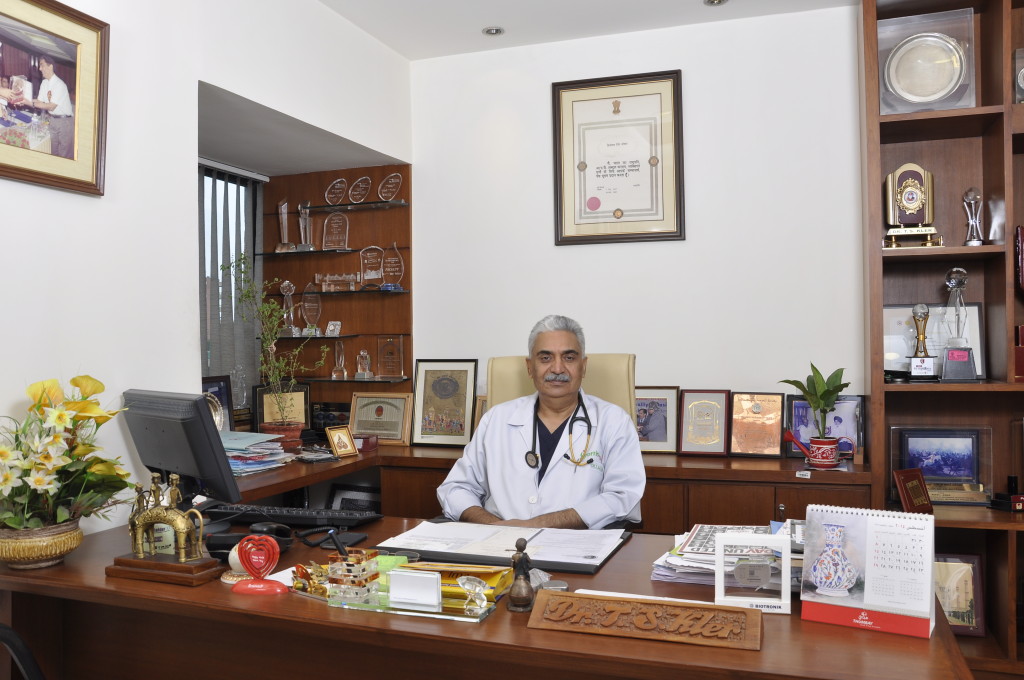- Dr T S Kler is Executive Director (Cardiac Sciences), HOD Cardiology, Director Electrophysiology at Fortis Escorts Heart Institute & Research Centre, New Delhi
- At an informative session with Rohtak’s cardio physicians, Dr Kler discusses the advantages of latest devices and minimally invasive surgical techniques
Rohtak, March 2014: One of India’s leading Interventional Cardiologist & Electrophysicist Dr T S Kler today held an interactive session with Rohtak’s leading cardiologists and physicians to discuss with them the recent advances in the field of Cardiology and Cardiac Devices in India, including leadless and MRI conditioned pacemakers, and minimally invasive mitral valve surgeries.
The objective of the session was to increase the flow of information between doctors and create a more liquid system of sharing the latest and best practices in the field with practitioners in the deeper and more interior parts of the country. Dr Kler is Executive Director (Cardiac Sciences), HOD Cardiology, Director Electrophysiology at Fortis Escorts Heart Institute & Research Centre, New Delhi, and has recently performed abreakthrough procedure in the field of Cardiac Electrophysiology in India, conducting the country’s first pacemaker implant via His Bundle pacing, a new technique that saves more lives in the longer run as against the traditional implant procedure.
At the talk session in Rohtak, Dr Kler spoke about the latest advances in interventional cardiology and devices that are transforming the face of Cardiology. “With a lot of research being dedicated to it, the field of cardiology is witnessing rapid changes and transformation. These advancements have succeeded in achieving significant reduction in cardiovascular deaths, myocardial infarctions, stroke, and stent thrombosis. Interventional Cardiology is one branch that has brought revolutionary changes to the way cardiovascular diseases are treated. Interventional Cardiology too has come a long way from the era of Plain Balloon Angioplasty to Percutaneous Valve Replacement. Still a lot has to come from its arsenal of intervention Cardiology. More focus is required on degenerative and rheumatic valvular disease and Left Ventricle dysfunction,” said Dr Kler.
“Remarkable developments are taking place in finding solutions to surgical and device related risks to ensure longer life expectancy of cardiac patients. Leading Indian Cardiologists have made sure these advancements are brought to India and made available to the Indian population. It is also important to spread the information about the technological and surgical advancements to the community of doctors spread across the country including in smaller towns and cities,” added Dr Kler. Among the subjects discussed during the talk session were Transcatheter Mitral Valve Replacement, Trans Catheter Aortic Valve Implantation, Leadless Pacemakers, MRI conditioned pacemakers, among others.
MRI conditioned pacemakers are a major boon for patients who may need an MRI at some point of time in life after being implanted with a pacemaker. It is important to note that there is a 50 per cent probability that cardiac device patients will be indicated for an MRI over the lifetime of their devices, and the pacemaker (which is not conditioned to MRI) may deny them this facility.
Another major advancement in the field of devices is Leadless Pacemakers to overcome the limitations of trans venous leads. The wireless pacemaker clings on to the inside of the heart via four small metal hooks. The device then generates electrical pulses that keep the heart beating at the right place. This cuts the risks associated with lead failure like vessel dissection, perforation or occlusion, valve damage, bleeding, systemic infection etc.

